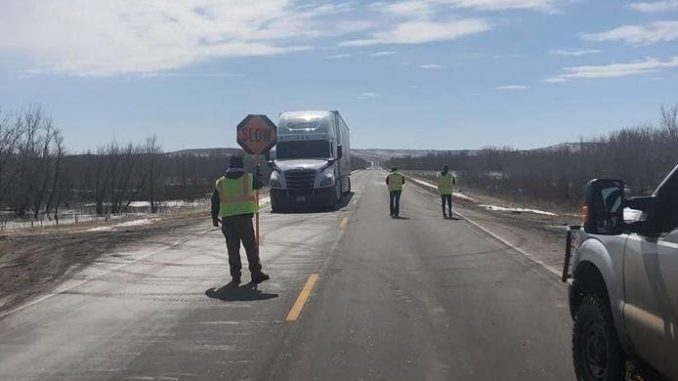
Leaders of the Oglala Sioux and Cheyenne River Sioux tribes threw cold water on South Dakota Gov. Kristi Noem
’s (R) demand that they remove coronavirus checkpoints installed on state and U.S. highways within two days or face legal action.
“We have an inherent and sovereign right to protect the health of our people, and no one, man or woman, can dispute that right,” Julian Bear Runner, president of the Oglala Sioux Tribe, said in a video posted to Facebook over the weekend.
“We must adopt serious measures to proactively deal with the serious public health crisis. We demand you to respect our sovereignty,” he continued. “Your threats of legal action are not helpful and do not intimidate us. The only way we can get through this is to work together as a nation.”
His remarks come in response to a warning Noem made Friday in which she demanded Bear Runner and Harold Frazier, chairman of the Cheyenne River Sioux Tribe, remove coronavirus checkpoints the tribes had set up to monitor traffic and help mitigate the COVID-19 outbreak amid the pandemic.
In the request, Noem cited a memorandum issued by the U.S. Department of the Interior’s Bureau of Indian Affairs in early April that her office said “makes it clear that tribes must consult with the state of South Dakota and enter into an agreement with the state before closing or restricting travel on State or US Highways.”
“Neither consultation nor agreement among the tribal and state government occurred. Regardless, the Cheyenne River Sioux Tribe and the Oglala Sioux Tribe established checkpoints on State and US Highways to control and restrict non-tribal member travel,” her office said in the release on Friday.
In his response to Noem’s warning threatening legal action, Frazier said that he “absolutely” agrees officials “need to work together during this time of crisis.” But he added that Noem, in “continuing to interfere in our efforts to do what science and facts dictate” was undermining “our ability to protect everyone on the reservation.”
“Ignorant statements and fiery rhetoric encourage individuals already under stress from this situation to carry out irrational actions,” he said in a statement.
“The purpose of our actions is to ‘save lives rather than save face,'” Frazier continued while maintaining in his response to Noem that his tribe has “not stopped any state or commercial functions as you claim in your request.”
“The English definition of consultation is ‘a meeting with an expert or professional, such as a medical doctor, in order to seek advice.’ In the Lakota language, wóglakA means ‘to speak about something.’ In meeting with county commissioners, municipal, South Dakota Department of Transportation, Public schools and Federal agencies we have met the definition of consultation in both of our languages,” he said.
Bear Runner also said in his statement that his tribe believes it is operating “in full compliance” with the April memo, as it “has not closed non-travel roads or highways owned by the state of South Dakota or any other government.”
“It is not our intent to restrict access to such roads or highways,” he said. “We believe we are operating with your acknowledgement to our travel checkpoints since we advised you of the checkpoints and heard no objections.”
He added that tribal leaders are willing to discuss the matter further with “the United States in a government to government consultation.”
The Hill has reached out to Noem’s office for response.
*story by The Hill